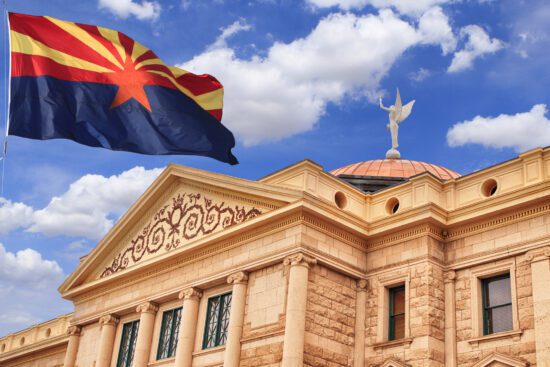There’s no doubt that many tables will be divided during this holiday season for various reasons. But as the discussions begin and potential tempers flare, Christians can exercise self-control and remember there is a greater reason for our engagement on important topics.
There’s a great need for the display of empathy in this day. Empathy, by definition, is the ability to understand and share the feelings of another. The Word of God describes this as love: “Love your neighbor as yourself” (Matt. 22:39). As we exercise this radical and supernatural love, it leads us to act out of empathy, to rejoice and weep with others: “Rejoice with those who rejoice, weep with those who weep” (Rom. 12:15).
Biblical love allows us to forgive and put-off offenses: “Above all, keep loving one another earnestly, since love covers a multitude of sin” (1 Peter 4:8). And this unique love keeps us from harming others: “Love does no wrong to a neighbor; therefore love is the fulfilling of the law” (Rom. 13:10).
But how do we grow in empathy, especially during tense times? How do we understand and share the feelings of another? James would say that part of our growth in loving others practically starts by being quick to hear, slow to speak and slow to anger (James. 1:20). Growing in empathy starts by listening to others. In order to encourage you to exercise empathy, especially during this holiday season, here are the voices of five women and their empathetic reflections.
Christian Walker | Kids City Director | Redemption City Church
I’ve lived a very homogeneous life. Most of the people who have surrounded me look and think just like me. I’ve never actually had deep friendships with others from different racial backgrounds. I grew up thinking that minority struggles, particularly for African-Americans, were something to be glossed over. I’ve heard family members and friends say things like: “Those things happened so long ago; why are people still mad?”
It’s easy for me to see how people who have never had an honest conversation or relationship with a person of another race can be apathetic. If most people’s experiences are like my own, it wasn’t an intentional apathy. I guess that’s why indifference is a special type of sin, because it is blinding.
In 2016, we experienced an ugly election campaign, intense racial divides in communities all across the nation and a vote to remove the Confederate flag as a symbol of hatred at the Southern Baptist Convention. My sweet grandmother, who is very educated and intelligent, debated with me over the symbol of the Confederate flag. Her response to the Civil Rights Movement was, “I am very friendly to blacks. When I pass a black lady on the sidewalk, we smile at each other.”
After I picked my jaw up off the floor, I realized her lack of understanding came directly from her lack of relationship. My grandmother is not a racist person; in fact, she’s tender-hearted and kind. But the distance between her and those around her is wide.
I realized that I might have said the same thing without my relationship with Trillia. She has opened up her heart and shared personal feelings with me. My understanding of pain and hurt for my African-American brothers and sisters comes directly from my personal friendship with a woman of another race.
I pray everyone would have the opportunity for a friendship with someone from another tribe and another tongue who could help us develop greater understanding and empathy for others.
Catherine Parks | Author of A Christ Centered Wedding
I don't think empathy comes naturally. It certainly hasn't for me. Proverbs 18:2 says, "A fool takes no pleasure in understanding, but only in expressing his opinion." If that doesn't sum up the echo chamber of this past year, I don't know what does. The Philippian church had to be instructed to not just look out for their own interests, but also for the interests of others (Phil. 2:4), and Jesus was their example for the kind of humility required to do this. Humility is a necessity when we choose to set aside our own opinions in order to truly understand and hear one another.
Many wise people have said that empathy requires proximity. I certainly wouldn't understand some of the issues facing Mexican immigrants without my neighbors, the challenges to people with disabilities if it weren’t for my friends and the fears of some of my African-American brothers and sisters if it weren't for relationships with Trillia and others.
I have no doubt that each of these people have been patient and long suffering with my questions and ignorance at times. It isn’t an easy burden to bear—to be gently educating others constantly—but they have done it with love. Perhaps that is their Philippians 2:4 obedience. Maybe all along they have known something I didn't.
I always assume I'm the one looking out for their interests by understanding them, and I think that's somewhat true. But I've realized they are also looking out for my interests. When they open up and share about their experiences, they are giving me a glimpse of the grandness of God's design for humanity, and especially the beauty of his Body. They are giving me an opportunity to step outside my limited, self-absorbed, daily existence in order to participate in something far greater.
Courtney Reissig | Author of Glory in the Ordinary and The Accidental Feminist
As Christians, our response to those who are different than us should never be fear. While our natural bent might be to retreat from otherness, Christ’s call on our lives is to empathy and understanding. In Christ, we have no need to fear.
First, to truly empathize we need to see our brothers and sisters as image bearers, not as “others” (Gen. 1:27). Bearing the image of God is our great leveler. Before the Lord, we are all created equal, we are all valued, and we all deserve to be heard. Our image bearing should drive us to seek to understand those who are different than us, not retreat from them.
But along with that, we must also recognize that the privilege and majority status of some of us does not make our vantage point the superior one. We should be compelled to use these things for good, not our own gain. We should treat others as we would like to be treated, which means listening, understanding and advocating for those who are oppressed and misunderstood (Luke 6:23). This privilege is a call to stewardship not prejudice. God didn’t create one ethnicity or cultural experience. He created many, and this forces us to confront our own biases as the majority. People of privilege have a responsibility to listen first, talk later (James 1:19)
In all of this, our greatest model for empathy is our Savior, Jesus. He went to people who were despised, rejected and outcasts of society. If image-bearing is the great leveler, the gospel levels us even more. In Christ, we have one Savior and one Church (1 Tim. 2:5). There is one way to be saved, and it’s on the basis of grace, not ethnicity, class or majority status (John 14:6; Gal. 3:28). The path to heaven is filled with people not like us, because God is calling all nations to himself. Let this fuel us to love and listen to those who aren’t like us, not turn away in fear or anger.
Kristie Anyabwile | Contributor to Women on Life and Word-Filled Women’s Ministry
Where is empathy? I wonder where others were when I poured out my heart about fears I felt for my own son in the wake of the deaths of young black boys and men. I felt the ache when I needed someone to grieve with me over faulty moral compasses that seem to value political parties and ideologies over people. I sensed the loneliness when I needed someone to listen, understand and validate—not negotiate—my feelings.
I didn’t need someone to assuage my grief; I just needed a friend to cry with me—to enter into my emotional space until my feelings became hers. When someone sits with me in that space, I feel safe, heard, loved and respected.
I’m often told to turn to Christ and remember the gospel, yet asking one another to help bear our burdens is turning to Christ. It’s using his appointed means to comfort and encourage his people. Are we not to fulfill the law of Christ by bearing one another’s burdens (Gal 6:2)?
For too long, empathy has been locked away in the darkest caverns of apathy that can spawn pride, self-righteousness, impatience, disunity and even hate. But exercising empathy allows us to enter into the emotional center of another, to feel what they feel, to see what they see, to own with them their fear, hurt, anger, joy and love. It’s the ability to understand and share in the feelings and experiences of another. Empathy is rooted in the kind of love that listens in order to understand with the intent of growing into deeper, more genuine love and practical care for one another.
Where there’s no empathy, there’s no Christian love and fellowship. Our Christian witness is tarnished without it. How can we love each other this way—genuinely, deeply, tenderly, humbly, compassionately, patiently, meekly—if we don’t enter the sacred space of another’s feelings and circumstances? We can’t live out our calling as disciples if we don’t love one another (John 13:35).
Christ set the example for us clearly, calling us to love one another just as he has loved us with a sacrificial, everlasting love (John 13:34). He loved us when we were unlovely. He loved us by entering into our grief, our pain, our sorrows, taking the sins of others against us and our own sins to the cross. Empathy is the pathway to loving others as Christ has loved us. Would you join me in unlocking and freeing empathy and rolling a stone of forgetfulness over the cavern of apathy?
Katie Richards | Director of Development for Siloam Health
This past week, I sat in a room and listened to my coworkers share the disappointment and sadness they (and members of their community) were feeling about our country. My coworkers represent various immigrant and refugee communities in my city, and each brings a unique glimpse into what is happening in people’s lives and hearts that live just miles from me.
It struck me that the church has an opportunity in the coming days to engage immigrants and refugees in our communities in meaningful conversations. I kept thinking of people I’ve had conversations with over the past few months that I wish were in the room with me, listening to the rich cultural perspectives being shared. Those people may not change their stances, but they may be moved to change their tone.
In the coming days, the church has an opportunity to go to the immigrant community and to invite others to come to know these communities. The church can lead the way in embracing immigrants and refugees that are living in fear for whatever reasons. We can lead the way in humanizing an increasingly inhumane conversation happening in our culture around these populations. We can lead the way in validating their status as fellow men and women, boys and girls, who are made in God’s image.
Perhaps this holiday season will be the beginning of new, helpful and needed conversations with others. As we seek to grow in understanding, let’s also ask the Lord to teach us to empathize that in a way that will ultimately reflect his love.










